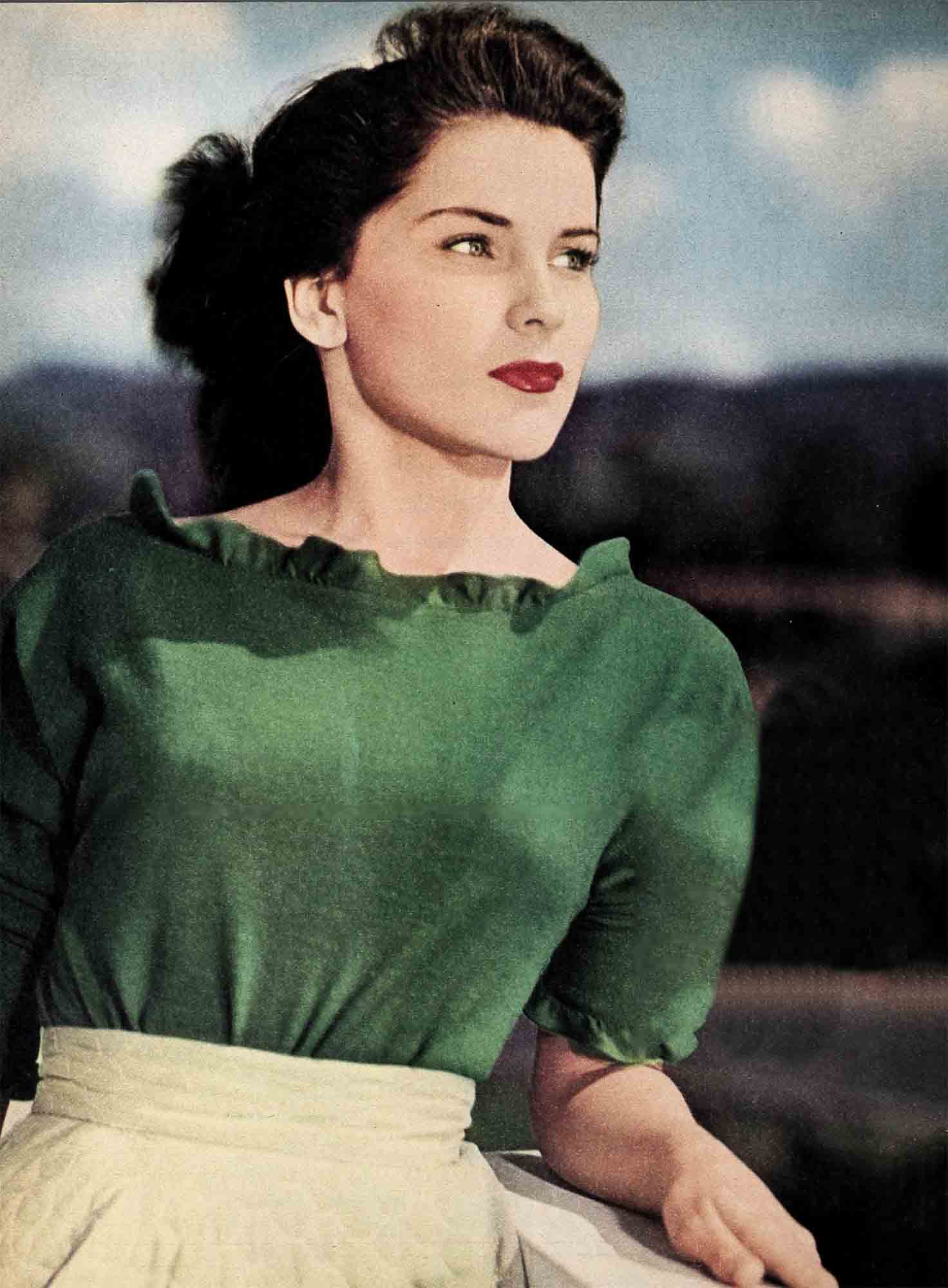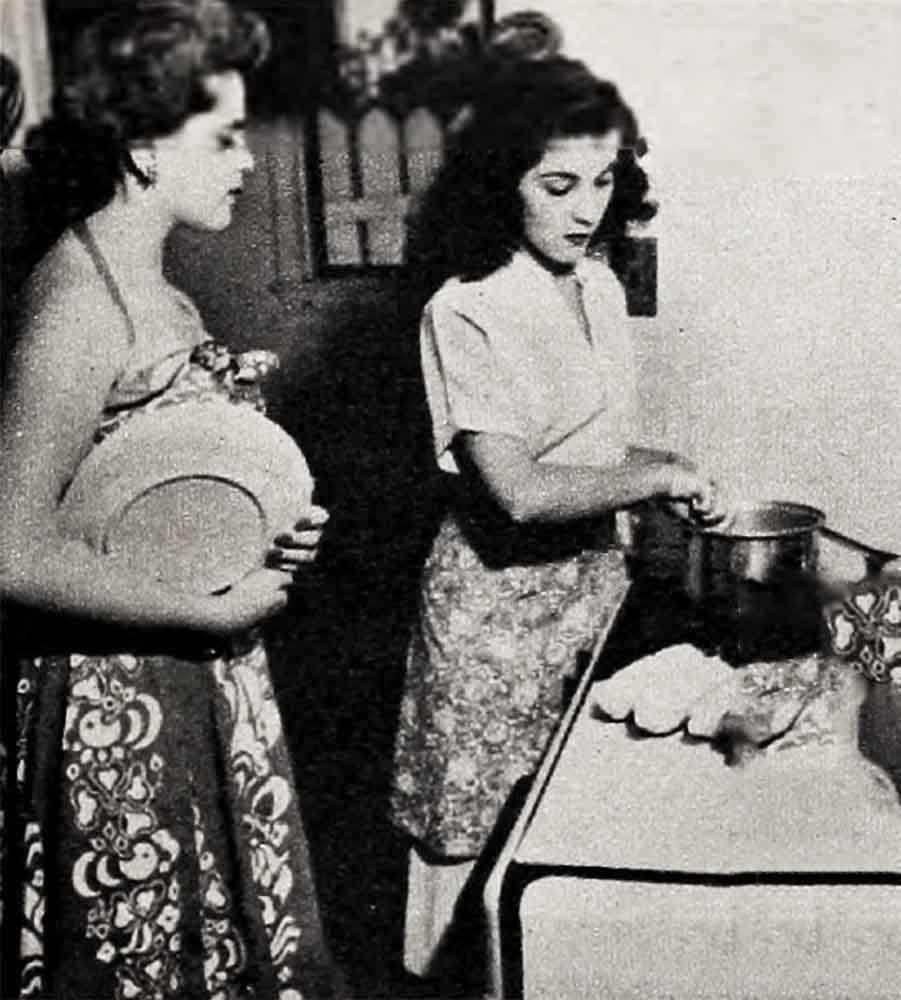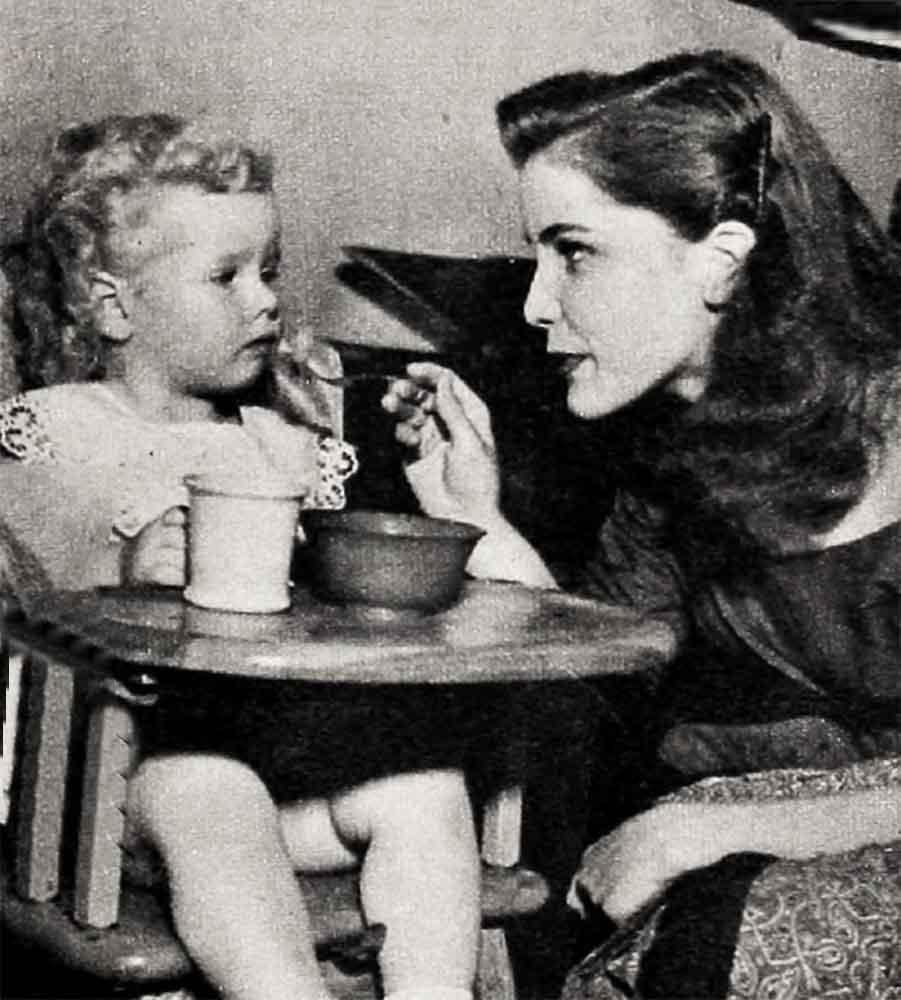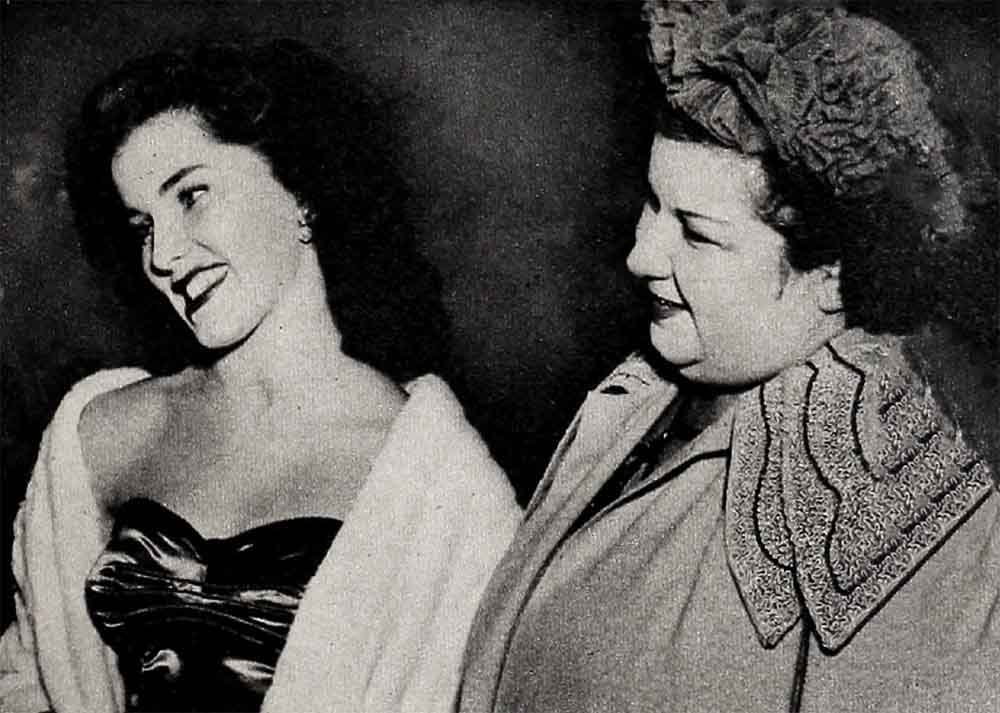Mama’s Girl!—Debra Paget
A studio employee, not long ago, approached Debra Paget’s mother—without whom Debra is never seen—to ask if Mrs. Paget would mind going to a premiere that night with another member of her family. “Debra should be photographed with someone else for a change,” he explained. “Hollywood is beginning to wonder why she’s never seen with anyone else!”
“Hollywood doesn’t have to wonder!” interrupted the usually placid Debra, suddenly appearing on the scene. “My mother isn’t with me because she wants it—but because I want it!”

That evening her mother accompanied her as usual. And Hollywood hasn’t stopped wondering. It isn’t normal for anyone as young (Debra turned eighteen last August) and lovely to prefer her mother’s company to that of all others. Many protest that Debra one day is certain to look back at her dateless teens and wish she hadn’t missed the beaus and excitement that are part of any growing girl’s heritage?
“No!” insists Debra. “I don’t have time for dates and things like that. My whole life is my work. Mom at this time can give me a lot more than any boy could. She gives me confidence and understanding. She coaches me. I’m not the calm, easy-to-be-with person I appear.” She could have passed, with her long pigtails and her wistful look, for twelve years old. “Mother lends me stability and, most of all, feeds my ambition. I am ambitious, you know.”

Hollywood knows also that Debra’s mother (whose professional name is Margaret Gibson) always has determined that her five children should follow in her show-business footsteps. From the time the oldest, Teala, could walk, she went everywhere with Mom—on tours, in stock, legit, even burlesque, absorbing the back- stage chatter and coming back home to tell the other children what she had discovered about acting. And Mom has coached the other children, too, in turn. There are long nights of reading one-act plays aloud. Not even the marriages of Teala and brother Frank have interfered with their careers. For Debra to have show business in her blood, then, is natural. What isn’t natural is her extra-strong attachment to her mother which shuts everyone else out.
Asked if she was afraid of people or shy, Debra turned a little defiant. “I’m neither! It’s just that with most people I would feel I was wasting my time. It’s more fun, too, on a free evening, to go to a movie with Mom. In fact, on Sundays we often see three movies—one at noon, then another, and still another after dinner. They teach me a lot about this business we’re in.”
“There are so many things a girl has to do for her career,” Mrs. Paget explained. “Personal appearances, working on location, going to bed early for those very early studio calls. All these things take up much of the time that ordinarily would be used for dating.”

We suggested there was time between pictures. “No!” Debra was emphatic. “Although I was just graduated from high school, I still have other lessons. Besides, I like to be home with the rest of the family as much as possible. And since we all chip in with the housework and take care of our own clothes, there isn’t much time left.”
Debra also insisted, vehemently, that she doesn’t miss the fun of sodas with the crowd at the corner drugstore, picnics with the bunch during school vacation, parties, or even the delight of double-dating.
“Who wants to waste the chance that I have to make something better of myself?” she demanded. “There’s always someone in the family to go with if I want a soda. And it’s a lot more fun to share family interests.”
As to that story that Debra doesn’t even buy her own clothes, she asks, “Why should I—when Mom’s taste is so perfect? Sometimes I go along with Mom—when she’s not sure I’ll like her selection. But I always do. She’s never wrong . . .”
Looking at Debra’s mother, plump, older, you wonder if Debra someday may not hear herself called an echo of her mother’s wishes, her mother’s personality.

To which Debra says, “Mom never has domineered over any of us. In fact, we had more freedom than most kids. Particularly about money. Everything that Dad, Mom or Teala or any of us has ever earned has gone into a family fund—a community chest, you might say. It still does. Any of us can take from it anything that we want. The knowledge that our taking leaves less for the others has made us more cautious about spending than if we lived on a budget. But that’s Mom. She gets the point across without having to hit you on the head with it.
“I do wish people would stop being critical of Mom, believe she is with me at my insistence. Because I need her. There’s nothing wrong or old-fashioned about depending on someone you love—it is too bad that enough people aren’t honest enough to admit this about themselves. And frankly, not enough people have a mother like mine.”
Debra is forever eager to see that people do not get her mother wrong. She takes pains to tell you that although legally it is no longer necessary for her to have a chaperone, since she has passed her eighteenth birthday, she insisted it be put into her contract that her mother can be with her anywhere, any time.
“This business about not liking my mother to go along with me to premieres!” she protests. “I’d like to hear them tell Jeanne Crain or any married star that she couldn’t be seen with her husband so much! Well, until I marry, my mother will escort me—as I shall expect my husband to do later on.”
She does then dream about marriage.
“I like the tall, masculine, quiet type,” she says. “Of course I shall have to marry someone who will let me continue my career, even though I do not mean to allow my career to rule my married life. I want to blend the two into each other in the wonderful way my mother has. She has been married to Daddy for twenty-eight years—and to look at them is a true inspiration.”
It is hard to look at Debra, to remember the passionate dark-skinned maiden she played in a couple of her pictures, without feeling she must have a desire for all the things natural to young girls. Hollywood believes she should have handsome young men singing love songs to her on dimly lighted dance floors—and wonders if her confined existence of career, home and mother will not one day lead her, as it did Jeanne Crain, to such a sudden romance and elopement as estranged Jeanne and her family for a long time.
Debra hopes no romance will come along during the next few years. “You don’t have to seek it to find it,” she nodded wisely to me. “A girl’s heart can find the right man if he’s only a stranger passing by. She needn’t date everyone else just to be sure she hasn’t been overlooked by Fate. I meet many people in my work, but for the time being I belong to myself and my family and love it!”
Although it is the general feeling that this is not enough for a girl of eighteen, few ever venture to say anything of the kind to Debra—to set her big eyes to smoldering and start her talking in exclamation points—for all the world like a knight in armor, defending her beloved Mom.
THE END
It is a quote. PHOTOPLAY MAGAZINE JANUARY 1952




